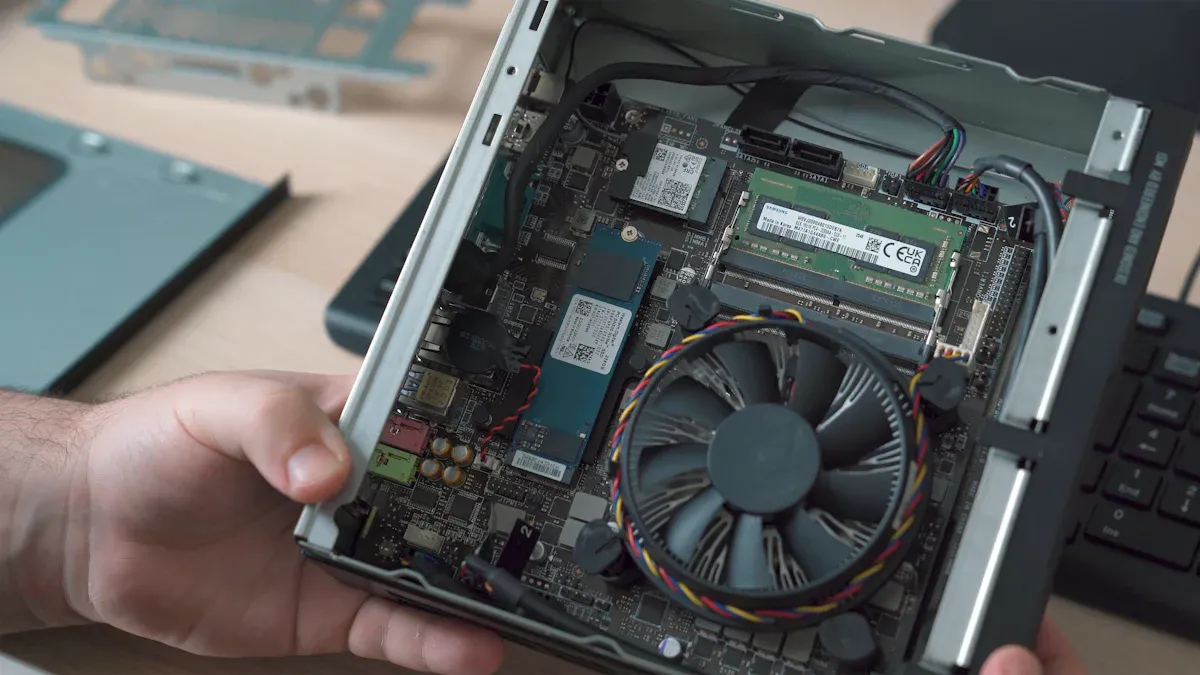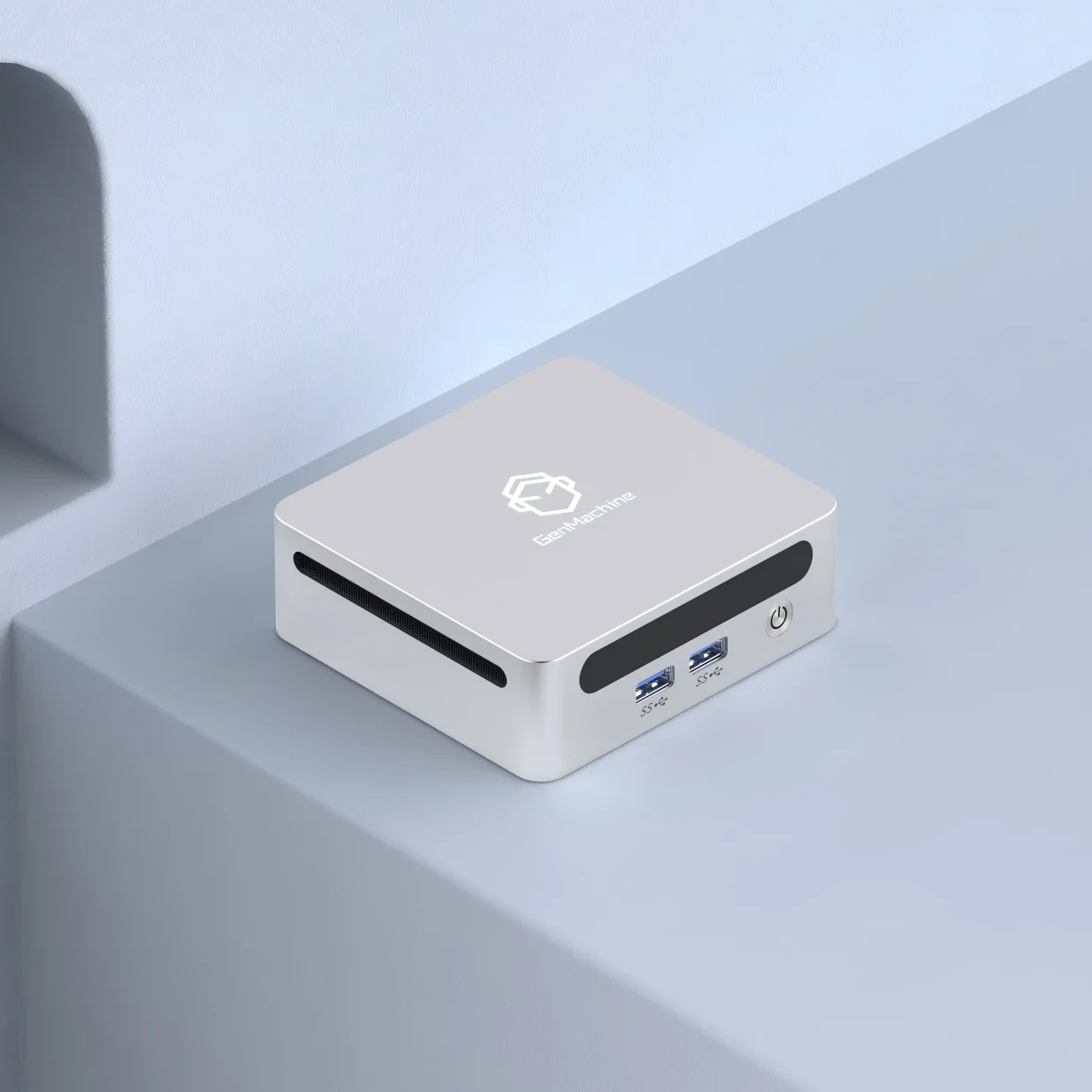Do mini PCs with GPUs get too hot easily? Not all the time, but people worry about it. Many users see high heat, sometimes up to 90-96°C when gaming or working hard. They wonder if a mini PC’s cooling is enough. Some people are scared that overheating could break their device, even though it usually shuts down by itself.
Overheating Causes in Mini PCs

Compact Design and Airflow
Mini PCs have a small and compact design. This design can help air move quickly through the case, which sometimes makes cooling more efficient. Some cube-shaped mini PCs can achieve surprisingly efficient cooling compared with traditional tower cases, depending on the internal layout and fan design. However, the tight space inside mini PCs can also make it hard for air to flow around the cpu and gpu. When air cannot move freely, heat dissipation becomes a problem. The cpu and gpu need cool air to keep working well. If the air gets trapped, the temperature rises fast.
GPU Power and Heat
The GPU inside mini PCs can use a lot of power. Some high-end mini PCs with discrete GPUs can reach a total system power draw of around 300–400 watts under load, though this depends heavily on the GPU model and cooling design. High-performance gpus, like the AMD Radeon Pro W6600 or the MSI GeForce RTX 3090, create a lot of heat. The cpu and gpu both work hard during gaming or video editing. This makes heat dissipation even more important. If the cooling system cannot handle the heat, the cpu and gpu may slow down to protect themselves. This is called thermal throttling.
Mini PCs with powerful gpus need advanced cooling solutions.
Heat dissipation must keep up with the high power of the cpu and gpu.
Without good airflow, the system can get too hot and slow down.
Dust and Ventilation
Dust is a big enemy of heat dissipation in mini PCs. When dust builds up inside, it blocks the airflow that cools the cpu and gpu. Fans and vents can get clogged, making it hard for hot air to escape. This causes the temperature to rise and can lead to thermal throttling. The cpu and gpu will lower their speed to avoid damage. Regular cleaning is very important for mini PCs. Keeping the vents and fans free of dust helps with heat dissipation and keeps the cpu and gpu running smoothly.

Factors Affecting Mini PC Temperatures
Cooling Solutions
Mini PCs use different ways to stay cool. Most mini PCs use single-fan router coolers. These fans are about the same size as desktop fans. They fit well in small cases. Some of Mini PCs also take the way of fanless cooling solution.
Usage Scenarios
How you use a mini PC changes how hot it gets. Here is a table that shows how different tasks affect temperature:
Usage Scenario | TDP Range (Watts) | Description |
|---|---|---|
Office Work | 4-25 | Good for browsing and streaming. |
Creative Tasks | 25-45 | Used for photo/video editing and coding. |
Gaming/Intensive Work | 50-95 | Needed for a strong gaming experience. |
During heavy workloads, GPU temperatures often reach 75–90°C. If temperatures frequently stay above 90°C, it may indicate limited cooling efficiency and should be checked.
BIOS and Software Tweaks
Mini PCs let you change settings in the BIOS to help with cooling. You can adjust fan curves to make fans spin faster when it gets hot. This keeps the mini PC cool during long gaming sessions. Some software tools, like Open Hardware Monitor, Argus Monitor, and TG Pro, help you watch temperatures and control fan speeds. These tools make it easier to find problems before they get worse.

Signs and Risks of Overheating
Performance Drops
When a mini PC with a GPU gets too hot, you might see changes in how it works. The computer can slow down, and games may not play as well. Here are some signs to look for:
The fan gets louder as it tries to cool the system.
Programs may stutter or lag, especially if they are heavy.
Even easy tasks can take longer and feel slow.
Thermal throttling is a main cause of these problems. When the GPU or CPU gets too hot, the system slows down to stay safe. This makes games less fun and lowers frame rates. You might also feel the back or sides of the case getting hot. If these things happen a lot, the mini PC may not work as well over time.
Hardware Stress and Crashes
Overheating does more than slow things down. It can also stress the hardware and cause crashes. Some people say their mini PCs shut off during heavy use, especially if the temperature hits 100°C. Turning off Turbo Boost in the BIOS or changing the fan and thermal paste can help, but these fixes show a bigger problem.
If the mini PC stays hot for a long time, it can hurt the hardware.
Small fans can break if they run fast all the time.
Too much heat can make the CPU, GPU, or battery stop working or shut off.
If the mini PC overheats again and again, the GPU and CPU may not last as long. High heat during gaming or editing can cause freezes, crashes, and more hardware problems. If you do not fix these issues, the mini PC can become unreliable and not work well.
Conclusion
Keeping your mini PC cool is all about smart design, good airflow, and regular maintenance. Even powerful models with GPUs can run quietly and efficiently when the cooling system is well planned. If you want to learn more about how to prevent overheating and improve system performance, check out this detailed guide on why mini PCs overheat and how to fix it. It offers clear, practical tips to help you get the best performance and longer life from your device.





